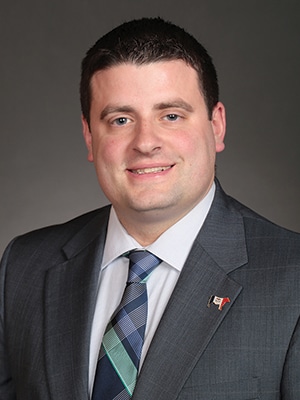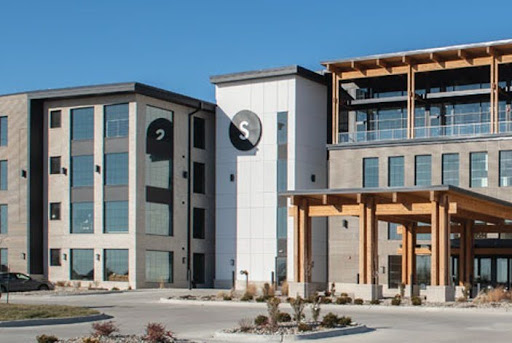Iowa House GOP leader ‘pretty confident’ 2024 will bring more action on taxes
Legislative session could feature faster march toward 3.9% flat income tax

Mike Mendenhall Jan 9, 2024 | 6:00 am
4 min read time
1,026 wordsBanking and Finance, Economic Development, Government Policy and Law, Statewide News
With four days to go before the Iowa House of Representatives and Senate gaveled in the 2024 legislative session, House Speaker Pat Grassley told the Business Record he felt “pretty confident” that the GOP majority will take more action on state tax policy.
In 2022, the Iowa Legislature approved and Gov. Kim Reynolds signed into law sweeping income tax cuts that would simplify the state’s income tax brackets from nine to one and institute a flat 3.9% rate by 2026, a drop from the previous maximum rate of 8.9%.
“I think we’re in a position through our budgeting and through our Taxpayer Relief Fund … the House would be in a position where we want to look at speeding up those tax cuts to get money back in the hands of Iowans,” Grassley told the Business Record in an interview Jan. 4.
When asked if the timeline to 3.9% could be accelerated to as soon as this year, the Republican from New Hartford said, “I think that’s a possibility.”
“This is more of a global answer to tax policy from our caucus’s perspective, as long as it’s something that’s sustainable and doesn’t raise taxes, which in this case, we think we can do that with sustainability, moving it up even as quickly as this year. If we feel that works, I think that’s going to be something we’re definitely interested in,” Grassley said.
House File 2317, negotiated in 2022 by House and Senate Republicans and Reynolds, will eventually create a single tax bracket, lower the corporate tax rate and eliminate tax on retirement income.
The nonpartisan Legislative Services Agency analysis found that when the law is fully implemented, it will drop the state’s tax revenue by $1.9 billion per year.
The latest estimate for the state’s 2024 tax receipts from the Revenue Estimating Conference shows total expected general fund revenue after transfers is $9.59 billion, down 1.3% from 2023. Personal income tax revenue is estimated to decline 6.7% from 2023, or by $80.8 million, according to the report.
Sales tax and corporate income tax is expected to grow by 5.1% and 1.5%, respectively. The Revenue Estimating Conference also estimated total tax revenue growth would be flat in 2025.
The House speaker called the revenue estimate adjustments “minimal,” but he said revenue will be one of the drivers of any legislation on taxes in 2024. According to Grassley, the Taxpayer Relief Fund currently has nearly $3 billion. Coupled with other reserves, he said the state has budgeted for any unexpected drop in revenue associated with tax cuts.
“We don’t want to make commitments we can’t keep, and we really would like to avoid raising taxes on Iowans … to reduce taxes in other places,” Grassley said. “I think we’ve budgeted and saved tax dollars in a way in which we can do tax adjustments with the revenue that we have.”
Grassley said there is another revenue forecast scheduled toward the latter part of the session, which is scheduled to end April 16. He said it’s too early for him to predict at which point during the 100-day session lawmakers might take up bills to accelerate tax cuts.
Grassley spoke to the Business Record before Reynolds gave her annual Condition of the State address on Jan. 9.
House Assistant Majority Leader David Young said in an interview Dec. 12 that the GOP majority would be waiting to hear the speech and watch future revenues before making moves on accelerating the tax cuts.
In the interview, Grassley was softer on the prospect of completely eliminating the state income tax this session, a goal of some conservative lawmakers and groups in Iowa.
“What can we do as quickly as possible? I think speeding that up is going to be what is the quickest amount of relief to give to Iowans. Whatever a long-term reduction or elimination of the income tax would look like in the future not only has to be sustainable but that isn’t something that provides the immediate relief that I think that we have the opportunity to do this year,” he said.
The business position and independent analysis
The 2022 tax law would drop Iowa’s corporate income tax to 5.5% if the state revenue hits a trigger – exceeding $700 million year over year from that source.
Iowa business groups hope the tax cuts will make the state more competitive to attract talent and recruit corporations to the state.
Joe Murphy, president of the Iowa Business Council, said in a Dec. 19 interview that getting to a flat individual income tax is important. The Business Council has not taken a position on what that rate should be, but getting to the 3.9% rate that was set in 2022 would be an improvement, he said.

Anil Kumar is a University of Iowa professor who served as an economist and researcher for the Federal Reserve Bank of Dallas for nearly 20 years from 2004 until joining the UI this month. He researches the effect of taxes and other public policies on labor market behavior and household finances.
He said if Iowa’s corporate income tax rate is reduced, it will likely improve the state’s business climate ranking with organizations like the Tax Foundation.
Kumar said there are benefits and drawbacks to having a flat income tax. He said a single tax bracket is more efficient and will likely increase taxpayer compliance. It could also cause more migration to Iowa, aiding the workforce.
“The flat tax is known to be more efficient, especially for higher-income individuals who are more sensitive to tax rates. And this is critical because you don’t want to tax groups which are highly sensitive,” Kumar said.
But Kumar said if revenue loss is not recouped elsewhere and causes a drop in government services, that could drag down the benefits of drawing and retaining more people in the state.
“But [the flat tax] … it will increase [income] inequality, and it’s also well known that a flat tax is not progressive where you are taxing more income at a higher rate, meaning it doesn’t scale with income, and this could potentially widen income inequality,” he said.

Mike Mendenhall
Mike Mendenhall is associate editor at Business Record. He covers economic development, government policy and law.











